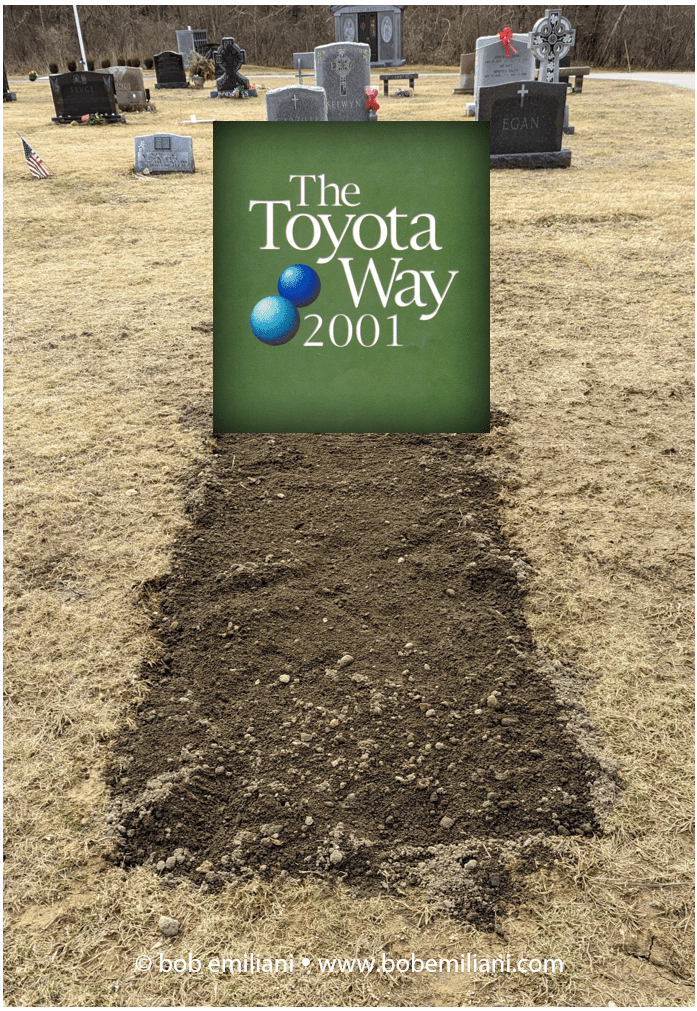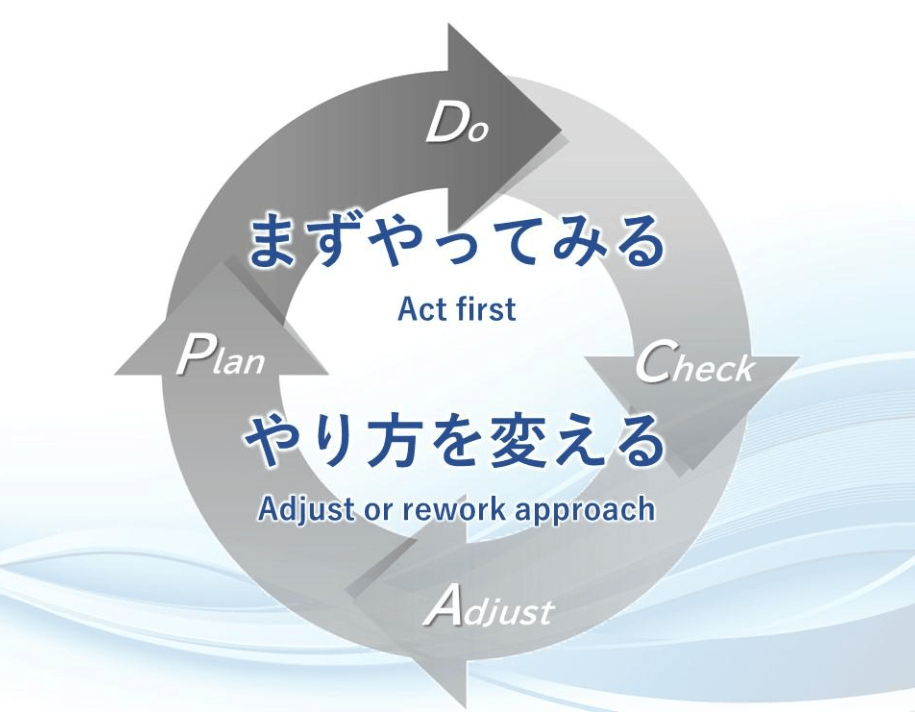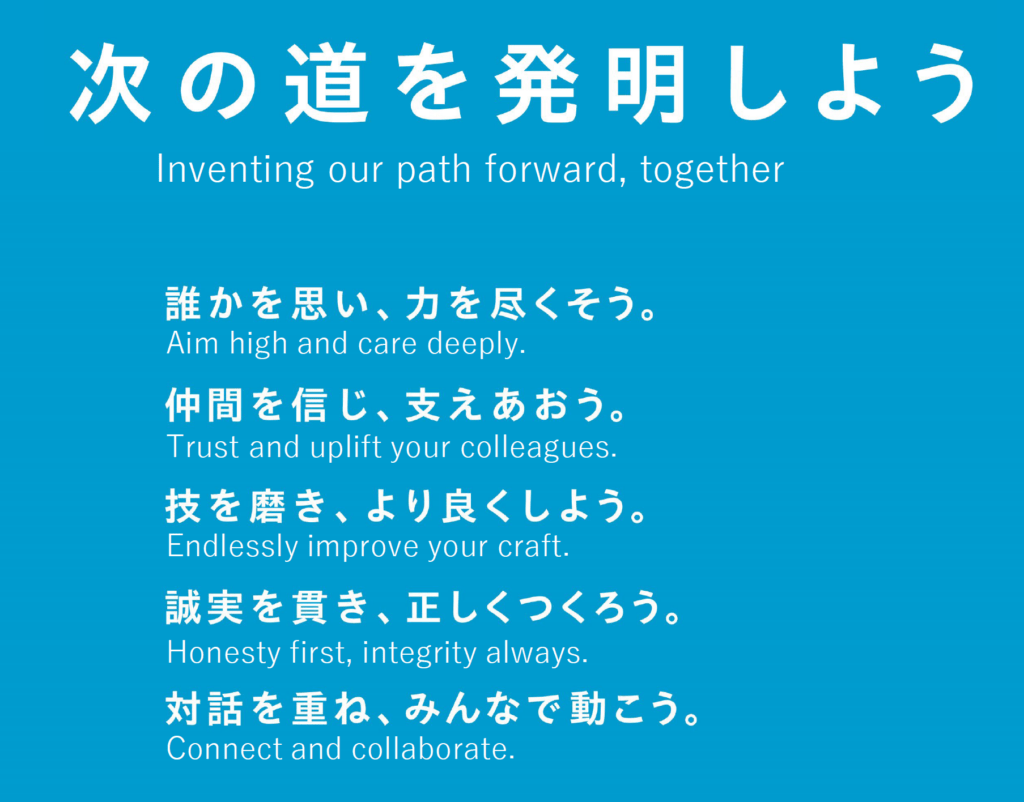My friend Emiel van Est wrote an insightful blog post titled “Has Toyota Lost Its Way?” You must read it. In the post he provides strong evidence that The Toyota Way, as described in Toyota’s 2001 document, and later in the 2020 update, may no longer be operative in Toyota Motor Corporation or its 17 group companies.
I’d like to share my view of The Toyota Way. The 2001 internal document was a backward-looking document that helped employees understand how Toyota got to its position of prominence at the turn of the century. While it did have forward-looking aspirations — i.e., do more the same — the reality is that nearly 25 years have passed since the document was published. Times have changed and circumstances have changed. Doing more of the same may no longer be the wise thing to do. Consequently, The Toyota Way, 2001 or 2020 versions, might not be as relevant as it once was. Indeed, The Toyota Way itself may now be dead.

SIDEBAR: Losing The Toyota Way began when former Toyota President Hiroshi Okuda (1995-1999; chairman until 2006) set a 15% global market share target in the mid-1990s. The rapid growth that ensued led to a shortage of internal know-how for producing vehicles that later resulted in the late 1990s-early 2000s vehicle quality problems. The production of “The Toyota Way 2001” document (led by then-president Fujio Cho) was meant to help team members understand the Toyota mindset and cope with rapid global expansion. Akio Toyoda is well known for his dislike of numerical targets.
For almost all of his tenure as president, Mr. Akio Toyoda has focused on getting back to basics. For example, the reformulation of the Shewhart-Deming PDCA cycle into the DCAP cycle, emphasizing the importance of starting with Do to quickly immerse oneself in trying out ideas and learning, and to avoid the likely delays that come when one begins with Plan.
In speeches dating from the start of his tenure in 2009, Mr. Akio Toyoda has emphasized the importance of the Toyota Production System (TPS) as an overall management philosophy, not just a production system, paralleling Taiichi Ohno’s view of TPS, as well as the importance of the giving authority to people on the genba. Mr. Toyoda has been consistent and firm in his view that TPS is fundamental. It is basic knowledge and capability-building that managers and employees must strive to understand and master.
In a speech on 30 January 2024, Mr. Toyoda presented this as the Toyota Group’s Vision to guide the next generation:
The group vision could be interpreted in many ways: As a call for teamwork, improved quality, creating new products and services, becoming more competitive, improving leadership and management, better customer value, and so on. It could also be interpreted as not enough inventing, not aiming high enough or caring enough, not enough trust and support, not enough commitment to improvement, not enough honesty and integrity, and not enough teamwork. It is a different message than The Toyota Way message. So perhaps The Toyota Way, useful for some 80 years, is less relevant or no longer relevant.
All of Lean world has been deeply invested in Toyota for more than 30 years. Maybe it is time for a change. Instead of lamenting the apparent fact that The Toyota Way might be dying or dead, Lean professionals should embrace the change because times and circumstances have changed. They should be happy that Toyota is “moving forward.” Perhaps you should as well. Maybe put away your Toyota Way books and start to think about what the need is now, not what Toyota’s need was then.
But when will you move forward? I have previously noticed large lags in time between when something happens and when the big names in Lean and others finally become aware of it or talk about it. For example, there was a 6-year lag from when Toyota published its internal Toyota Way 2001 document to when the Lean insiders, with deep contacts within Toyota, began talking about it. It would be another 3-4 years before the Lean community at large became aware of “Respect for People,” even though it was readily apparent if one was familiar with the history of progressive management.
If this pattern holds, Lean world will remain fixated on The Toyota Way and continue to battle over “Respect for People” for another four to six years before it begins to move on.
Still very much alive is the Lean tools mindset. Unfortunately, we cannot yet say “Lean Tools — RIP.” Nevertheless, you would be wise to change your thinking and embrace TPS and simply embed into it both “Continuous Improvement” (Kaizen) and “Respect for People” (“Respect for Humanity“) as Toyota has long done. Return to the fundamentals, the basic knowledge and capability-building that Toyota has so generously given to us, TPS, as both the management philosophy and the method. Don’t wait, start here.
P.S. You don’t have to worry about copying Toyota because that is simply not possible. But you can follow the template they have provided to create your own high fidelity version of TPS to reap the business and people development benefits.


